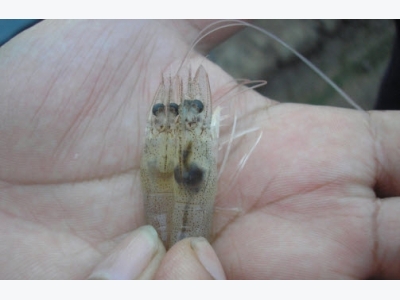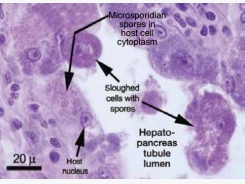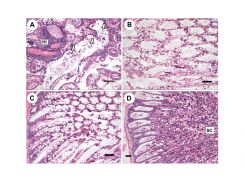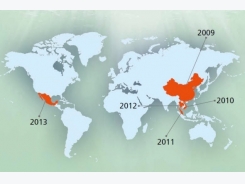Diseases of Crustaceans - Acute Hepatopancreatic Necrosis Disease (AHPND)

Juvenile Penaeus vannamei from Vietnam: left with AHPNS; right appears normal. Source: D Lightner
Signs of Disease
In the absence of identified biotic or abiotic cause(s) of the syndrome, the following disease signs can be used for presumptive (pond level) and confirmative (animal level) diagnosis of the disease
Disease signs at pond level
• Often pale to white hepatopancreas (HP) due to pigment loss in the connective tissue capsule.
• Significant atrophy (shrinkage) of HP.
• Often soft shells and guts with discontinuous contents or no content.
• Black spots or streaks sometimes visible within the HP.
• HP does not squash easily between thumb & finger.
• Onset of clinical signs and mortality starting as early as 10 days post stocking.
• Moribund shrimp sink to bottom.
Disease signs at animal level by histopathology
• Acute progressive degeneration of the HP accompanied initially by a decrease of R, B and F-cells followed last by a marked reduction of mitotic activity in E-cells.
• Progress of lesion development is proximal-to-distal with dysfunction of R, B, F, and lastly E-cells, with affected HP tubule mucosal cells presenting prominent karyomegaly (enlarged nuclei), and rounding and sloughing into the HP tubule lumens.
• The sloughed HP cells provide a substrate for intense bacterial growth, resulting in massive secondary bacterial infection (putative Vibrio spp.) and complete destruction of HP at the terminal phase of the disease.
• Accmpanying the initial sloughing of HP tubule epithelial cells and the development of a secondary bacterial infection is intense intertubular hemocytic aggregation and hemocyte encapsulation of necrotic HP tubules and melanization of the more proximal portions of HP tubules in some shrimp.

Pale atrophied hepatopancreas of juvenile Penaeus vannamei, indicative of AHPNS. Source: D Lightner

Pale atrophied hepatopancreas of juvenile Penaeus monodon from Vietnam with AHPNS. Source: D Lightner

Normal shrimp hepatopancreas with distinct R, B, F and E (inset) cells. Source: C Lavilla-Pitogo

Proximal-to-distal progression of lesion in the hepatopancreas with dysfunction of R, B, F and E cells. Source: D Lightner

Histopathology of Penaeus vannamei hepatopancreas from Thailand affected by AHPNS. Source: T Flegel
Disease Agent
Idiopathic – no specific disease causing agent (infectious or toxic) has been identified.
Host Range
AHPNS affects both Penaeus monodon and P. vannamei (P. chinensis was also reported to be affected in China).
Presence in Asia-Pacific
AHPNS has been officially reported in China and Vietnam (2010), Malaysia (2011) and Thailand (2012).
Important Notes
While the apparent spread of AHPNS throughout the region suggests an infectious or at least biological agent may be involved, thus far, laboratory challenge tests have failed to demonstrate that the disease is transmissible and no infectious agent or toxin has been identified. The histopathology is suggestive of toxicity. Testing of feeds from affected farms and two crustaceacides including cypermethrin have similarly failed to reproduce the disease. The disease is not related to any of the known shrimp pathogens like WSSV, YHV, IMNV, TSV. At this stage the cause is unknown, and the possibility of an infectious agent and/or toxin cannot be discounted.
Further information
The AHPNS news story, final report and audio recordings of 19 technical presentations during the Asia Pacific Regional Emergency Consultation held in Bangkok, Thailand (9-10 August 2012) are available at the following links for wider dissemination of scientific information about this emerging shrimp disease
List of Experts:
Prof. Donald V. Lightner
- Aquaculture Pathology Laboratory
- Department of Veterinary Science and Microbiology
- University of Arizona
- Building 90, Room 202 Pharmacy/Microbiology, Tucson, AZ 85721 USA
Prof. Timothy W. Flegel
- Centex Shrimp, 4th Floor Chalermprakiat Building Faculty of Science, Mahidol University
- Rama 6 Road, Bangkok 10400 Thailand
Related news
Tools

Phối trộn thức ăn chăn nuôi

Pha dung dịch thủy canh

Định mức cho tôm ăn

Phối trộn phân bón NPK

Xác định tỷ lệ tôm sống

Chuyển đổi đơn vị phân bón

Xác định công suất sục khí

Chuyển đổi đơn vị tôm

Tính diện tích nhà kính

Tính thể tích ao



 Historic Emergence, Impact and Current Status of Shrimp…
Historic Emergence, Impact and Current Status of Shrimp…  Early Mortality Syndrome (EMS) as new Emerging Threat…
Early Mortality Syndrome (EMS) as new Emerging Threat…